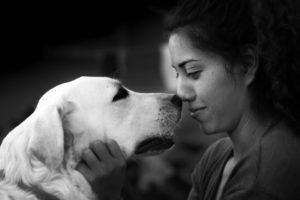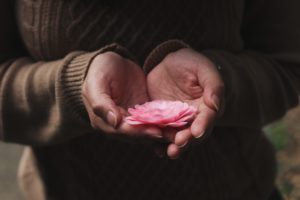by Jenny Rose | Jul 12, 2018 | Emotional Intelligence, Feelings
I’ve been thinking about loyalty recently. Loyalty is one of my bigger rabbit holes. I most often use the term when I’m beating myself up. A nasty little internal voice frequently hisses “Disloyal!” in my ear. This happens so constantly, in fact, that I’m bored. I’ve decided to unpack the concept of loyalty, spread it out, let the cat sniff at it, and either own my own disloyalty without shame or permanently silence that particular internal accusation.
The first thing I notice is I want to be loyal. Loyalty is a virtue. Good, loving people are loyal. I certainly want to be a loyal family member, friend and partner. Loyalty has always been an important part of my identity, which is why it’s such an effective lash for me. What’s more shameful and ugly than disloyalty?
I don’t want to be shameful and ugly. If I am shameful and ugly, I certainly don’t want anyone to find out.
Loyalty, then, is something that depends on what onlookers think about my behavior and choices.
Before I’ve even crawled into the mouth of the rabbit hole I’ve moved out of my power. Interesting.

Photo by Kevin Quezada on Unsplash
Recently, I took my morning cup of tea and spent two hours with dictionary, thesaurus and my laptop looking at poetry, quotes, memes, definitions and articles. I read about families, patriotism and dogs. I discovered 80% of results returned for a search on loyalty have to do with manipulating customer and product loyalty. Of course. What a world.
At the end of that two hours, I felt no wiser. I had some notes, but I still didn’t have a clear idea of what loyalty really is, what it looks like, what it feels like to give or receive it, and how it overlaps with trust, authenticity, truth, enabling, coercion and control. I can point to people in my life I feel loyalty for, and I can point to people who I feel are loyal to me, but the truth is I don’t trust myself on this issue. Maybe my confusion means I am, in fact, shamefully disloyal. A humbling and humiliating thought.
At the same time, would I feel so torn apart by family and personal social dynamics if I was thoroughly disloyal? My sense of loyalty to others has given me much anguish over the years. Surely if it was absent in me I wouldn’t struggle so hard with it.
Simply defined, loyalty is a strong feeling of support or allegiance. That definition leaves me even more clueless than I was before. It has to be more complicated than that, doesn’t it?
Well, doesn’t it?
Is it just me, or does the cultural definition of loyalty consist of a much more convoluted hairball of expectations, assumptions and false equivalencies?
I often use back doors when I feel stuck. My two hours of research did give me some ideas about what loyalty is not, at least in my mind. But already I can see others might disagree. Still, that’s why we have dictionaries and definitions.
Loyalty cannot be slavery or prostitution. If I have to compromise my integrity in order to fulfill someone else’s expectation of loyalty, it’s no longer a virtue, but an abuse and manipulation. True loyalty must be freely and heartfully given. Authentic loyalty can’t be bought, sold, stolen or owed. It’s not demonstrated by obedience or compliance. If it’s not free and spontaneous, it’s only a sham, an empty word that sounds great but has no substance. Loyalty is not a weapon. It’s a gift.
Said another way, from a perspective of power (and you know how much I think about power!), loyalty is a tool of power-with, not a weapon of power-over.

Photo by Seth Macey on Unsplash
Loyalty is not blind. Part of its value is its clarity. We prize it so highly because seeing and being seen clearly, warts and all, and demonstrating or receiving loyalty in spite of it is an act of strength and love. In that case, compassion, tolerance and respect are all involved in loyalty. It follows, then, that loyalty does not require agreement. I can feel entirely loyal to a loved one while disagreeing with some of their choices and beliefs.
Loyalty does not imply denial, arguing with what is or colluding in rewriting history in order to sanitize it. Loyalty is not a right or an obligation.
In fact, the thesaurus suggests the word “trueness” as a synonym for loyalty. Interesting. Isn’t trueness the same as authenticity? I count on those who are loyal to me to tell me the truth of their experience with me and of me. I count on them to trust me with their thoughts, feelings, concerns and observations. I count on them to ask me questions about my choices, and to forgive me when I’m less than perfect. I hold myself to the same standards. This can mean a hard conversation now and then, and uncomfortable vulnerability and risk, but real loyalty is not cheap.
The thesaurus also supplies the word “constancy” as a synonym for loyalty. Constancy is an old-fashioned word these days, but it leapt out at me because consistency is very important to me. I’ve had some experience with Jekyll-and-Hyde abuse patterns in which the goalposts and rules constantly change without notice, keeping me nicely trapped in trying to please people who have no intention of ever being pleased no matter what I do. Loyalty is present one day and absent the next, then present again, then unavailable. That kind of “loyalty” is an abuse tactic.
As always, the construct of loyalty is two-sided. There’s the loyalty that extends between me and another, and then there’s the loyalty I extend to myself. This circles back around to slavery, prostitution and silence. If I have to betray my own needs or make myself small in order to earn or retain someone’s loyalty, something’s very wrong. If I’m called disloyal for saying no, having appropriate boundaries or telling the truth of my experience, then we are not in agreement about the definition of loyalty or I’m being manipulated (again). How loyal can I be to others if I fail to be faithful to myself?
True loyalty will never require me to make a choice between myself and another. Loyalty is strong enough to compromise and collaborate.
Loyalty becomes weaponized when we demand or command absolute agreement, devotion and unquestioning support. Then the concept becomes very black and white. This is demonstrated all over social media and media in general. One unwanted question or view leads to unmerciful deplatforming, silencing and a torrent of threats and abuse. Our loyalty is questioned and tested at every turn. We allow bullies, tyrants and personality-disordered people to achieve and maintain control, terrified of tribal shaming, being unpatriotic or being cast out of our social groups and communities.
The label of disloyalty is extremely powerful, but when I strip away all my confusions and distortions around loyalty and return to the simple definition, it’s not complicated at all. I certainly feel a strong allegiance and support for many individual people, for my community, for my country, for women, for writers, for this piece of land I live on, and for myself.
I suspect many others would like me to wear the label of disloyalty, but I can’t do a thing about their distortions except hand them a dictionary. Very elitist behavior, I’m sure you will agree. Not to mention the disloyalty of refusing to collude in my own shaming.
Being called disloyal doesn’t make it so.
That voice in my head has to do better, find a new slur. I’m willing to own being disloyal if I am, but my conclusion after this investigation is mostly I’m not, and when I am, my greatest trespass is against myself. That I can do something about.
Loyalty. Setting down the weapon. Picking up the tool.

Photo by David Beale on Unsplash
All content on this site ©2018
Jennifer Rose
except where otherwise noted
by Jenny Rose | Feb 22, 2018 | Choice, Power
A small clay sculpture of a woman with her hands cupped in front of her chest sits on my desk. She holds a tiny clay bird and is surrounded by a couple of crystals, a piece of amethyst and a small geode. This little altar has been my daily companion for years. Wise and smiling, round and nurturing, the sculpture has comforted me through many losses, grief and rage. She’s one of my greatest treasures.

Letting Go
These days, the bird she holds is perched on the rim of the wooden dish she sits on, looking out at the room, at the world, at me. It can stay, or it can fly away. For now, it’s content to sit, watching and listening, as I live my life in these two small rooms at the top of our sagging farmhouse.
I have placed tiny polished garnets in the woman’s cupped hands where the bird once nestled.
I had a friend, dear and wise, in my old place who once said to me if we open our hands and let something go, and keep our hands open, something new will come and fill them. As she spoke, I again saw the image of an open hand, generous, allowing freedom, and prepared to welcome and support the next thing, and the next.
Letting go is power. Letting go is serenity. Letting go is an authentic act of love toward self and others. The usefulness of letting go is not a secret. Almost any self-help book out there talks about it as an aspect of healthy functioning, but I think popular psychology doesn’t explore it deeply enough.
Letting go doesn’t mean we brush aside our feelings. Not at all. Unexpressed feelings cement us in place. We all know people who remain frozen in time because of a death or traumatic event. Years and decades pass, but they don’t heal. They don’t move on. Their emotional growth is arrested. This is what unfinished emotional business looks like. Unexpressed feelings can’t flow through us and dissipate so we can release them.
We know very little about appropriately expressing our feelings in this culture.
Feelings aren’t thoughts. They’re not stories, expectations, beliefs or ideology. They’re not labels or rules. Like it or not, admit it or not, we’re physiologically wired for feelings, and they give us good information about how things are with us. Our thoughts and beliefs, on the other hand, are frequently distorted, confused, misinformed, outdated or otherwise unreliable.
That’s where letting go comes in.
We’ve all had events in our life that left deep scars. We’ve all seen things we can’t unsee, heard things we can’t unhear and done things we can’t undo. We’ve all felt disempowered or victimized at one time or another. Death and disaster enter our lives with no warning and take those we love.
Some people move on from such events with more grace than others. I suspect part of that grace has to do with forgiveness. Not forgetfulness, but forgiveness of self and others. I suspect another part is the ability to fully experience and express the feelings attached to the event. That requires a certain kind of support, and many folks don’t have it. Some people simply don’t choose to move on or let go. They center their thoughts, feelings and energy in the event, whatever it was, and they hold it tight, cherishing it, feeding the fire of their pain, keeping their scars open with the razor blade of their attention and focus. It becomes part of their identity, part of their story, a grievance to cling to, a betrayal to treasure, a wound to worship.

Photo by Andrey Grinkevich on Unsplash
I have a book called Clean Sweep, by Denny Sargent. It’s filled with rituals and instructions to help us let go of what no longer serves us. The author outlines a banishing exercise in which he suggests the reader visualize holding tightly to a thorny branch. In my own version, the branch is heavy, so heavy I can hardly hold it, which drives the thorns deeply into my flesh. The branch is a person, event, memory or belief that gives us emotional pain. We can make an easy choice and cling to it, cradle it, embrace it, let it tear our skin and make us bleed. We can make a harder choice and set it down, open our hands and let it fall. We can walk away from it. We can burn it or bury it.
In order to let go, we have to be willing to surrender control and endure loss. Letting go of a core piece of identity, a long-held belief or a painful memory is difficult work, even when that core piece, belief or memory gives us great pain. Letting go will leave a hole. Then what? Then who are we? How do we fill that hole? How do we understand ourselves and our place in the world? This is scary stuff.

Photo by a-shuhani on Unsplash
Aristotle said nature abhors a vacuum. My friend was right. If we open our hand and release what we’re holding, something else will come, though we can’t predict or control what it might be. In fact, the thing released might return to us in another form. We can’t know. We’ll never know unless we release our need to control. We’ll never find out what might perch on our open hand if we’re not willing to walk through loss in order to reach gain.
I’m having a long and involved break up with my desire to control. Some days I go all day without thinking about it, and other days I want to micromanage everyone and everything in my life. Some days I feel light and free, a confident and lovely woman, and other days I feel like a grubby three-year-old hiding under the covers sucking my thumb because nothing and no one is the way I want them to be. I sulk and pout and snarl and I feel crushed by the thorny weight of my need to control.
Then, at some point, my eye falls on my little clay wise woman and her cupped hands and wide-open heart, and I say, “Oh, yeah. That’s right. Letting go.”
I feel annoyed when people tell me to “get over it.” First of all, I have a right to my feelings, and secondly, it’s not that easy. Letting go, for me, is a practice, and I need time to engage in it. Sometimes I go back and find my leaden armful of hawthorn or bramble or locust and hold it again for a while, opening up all the old wounds, exhausting myself, hurting myself, and, finally, opening my hands and letting it fall again. Sometimes I need to design a ritual for letting go, a prayer or a dance or some kind of purification rite. Sometimes I need to make a physical resting place, like a grave or a patch of garden or a newly-planted tree in order to let something go. For me, taking time to honor whatever it is I’m trying to release is helpful. Whatever it is that no longer serves, it was once a part of my life and experience. Laying things to rest in this way helps me release them fully and finally.
When it comes right down to it, this blog has been an exercise in letting go as much as anything else.

Photo by Ester Marie Doysabas on Unsplash
When we know how to let go, we increase our power, as well as the power of others. Often, what we desperately hold onto is people. This is a strong archetype in old stories; locking the beautiful maiden in the stone tower to “protect” her. Part of love, as any seasoned parent will tell you, is letting go. Imprisoning, disempowering and trying to control others isn’t love. Refusing to let go of someone isn’t love.
Releasing our grievances with others frees them as well as ourselves. Being willing to accept an apology, an explanation, and the imperfections of others allows us all to move forward with lighter loads. The stories and memories we hurt ourselves with are often ghosts, events involving people who are long dead and far in the past. We can choose to bless them and lay them to rest.
I don’t want to haul around painful memories, toxic garbage, the futility of trying to control life and ineffective behaviors and beliefs. I can’t swim with all that tied to my ankle. I can’t dance. I can’t embrace anything or anyone with an armful of brambles. I can’t create with a heart full of thorns.
I want to be free.
I open my hands.

Photo by Stephen Leonardi on Unsplash
Make a Boat
Make a boat
out of who you are
not what you have.
If you don’t know who you are
(Search for the desert between the worlds.
Find Bone Mother.
Recollect.
Reassemble.
Bathe in soul.
Birth yourself.)
That is another journey.
Your boat will be small.
You can take no one.
You can take no thing.
Shape your boat with your truth.
Shape it with the joy in your hands
and the wisdom in the soles of your feet.
Make a chisel of rage and grief.
Sand with the grit of clarity.
Stain with blood.
Oil your boat with the moisture and musk of your sex.
Stitch the rags of your life into a sail.
Weave rope from your hair.
Take your time
And remember
Fear does not float.
When you know the boat is ready,
Sit in it.
Lay the backs of your hands on your knees.
Open your hands.
Let everything go.
Let everything go.
Keep your hands open
So that new things may come.
Without fear
Ask the one who stands just behind your shoulder
The one who shelters your life in the shadow of her wing
To come forward.
She will guide the boat.
Surrender yourself to your boat,
to the water,
to your guide.
Find your breath.
Stay there.
Find your heartbeat.
Stay there.
Keep your hands open.
Rest.
Don’t stand up in the boat!
Don’t throw yourself out of the boat!
Don’t you want to see where you are going?
Look. See how the feathers on her wing
trail in the water?
All content on this site ©2018
Jennifer Rose
except where otherwise noted
by Jenny Rose | Feb 15, 2018 | Contribution, Emotional Intelligence
I’ve been trying to frame a post around generosity for several months. Interestingly and unexpectedly, the idea of generosity has remained a Gordian knot in spite of word webs, notes and lengthy simmering in the back of my mind. Since I began chewing on the idea of generosity, I’ve discovered Unsplash, a site offering free use of photographs for things like this blog, and now I finally feel I’m getting a grip on the subject.
Unsplash features more than 300,000 photos from more than 50,000 contributors. It’s free to use and free to join. Users may upload photographs for whatever they want as frequently as they want.
If generosity is unconditional readiness or liberality in giving, Unsplash is surely a fine illustration of the concept. The Internet is filled with people practicing their art. Some are trying to make a living. Many, like me, provide free content. Others start out contributing freely and then uplevel in order to earn a little bit of money with advertising, an Amazon affiliate program, a subscription fee, etc. In my view, some of the content out there is worth paying for, and other content is not.
Unsplash is worth paying for. Many of the photographers who contribute are professionals with content to sell, yet they continue to share some of their work freely with others.
Up to this point, I haven’t made a dime on this blog. It wasn’t about the money, but exercising my voice, my writing skills and my courage. I had no idea where it would go or what would happen with it. I had no idea if anyone would read what I wanted to write or how much I would grow to value the weekly practice of posting and maintaining a blog. I do want, however, to publish and sell my books in the future.
I think part of my struggle to get my head around generosity has been my own damaged sense of value. Those of us who feel we’re worthless assume we’ve nothing to give. I can’t tell you how many times I’ve declined attending a pot luck, a fundraiser, a party or even a funeral. I tell myself I have nothing to contribute, I was invited out of obligation or kindness, and nobody will even notice my absence.

Photo by photo-nic.co.uk nic on Unsplash
I am not Cinderella, and I do not possess a fairy godmother who will make me socially acceptable or worthy.
I wonder, looking back, if others have experienced me as being ungenerous or mean because of my lack of social contribution, when what was really at work was introversion, social anxiety and an abysmal sense of self-worth. I have no way of knowing.
On the other hand, I’ve volunteered my whole life. I’ve spent years working with children as a librarian, tutor, child development clinician, teacher’s aide, swim teacher and parent. I’ve participated in fire and rescue work as a volunteer EMT, as well as with animal rescue organizations. I’ve volunteered in libraries and as an oral storyteller, and I’ve volunteered as a dancer. I’ve worked in hospitals, nursing homes, public schools and libraries.
See? Nothing to contribute.
I earned a paycheck for some of that work, but one doesn’t get rich doing the kind of jobs I love to do, and the paycheck was never my motivation. I just loved the work. I felt as though I was making a difference in every one of those roles.

Photo by Annie Spratt on Unsplash
I’ve always limited the idea of generosity to financial resource. Part of my shame about my poverty is that I’m unable to be financially generous, which I’ve believed automatically makes me stingy and uncharitable. If my generosity is measured by what I spend, it’s so small as to be negligible. I’m a rotten capitalist consumer.
In thinking deeply about generosity, I can see how my beliefs have distorted my view. I wrote some time ago about the failure of money, and that peeled away some of my limiting beliefs, but only the first layer or two. If I make generosity about money, I can never be generous, and I block the financial generosity of others toward me because I can’t reciprocate in kind. My desire to give is greater than my desire to receive. I desperately want to make a contribution. I feel disempowered when I can’t reciprocate someone’s generosity in a way that feels equal, and then I disconnect.
Unhooking generosity from money changes the way I look at it. Developing some trust in my own value also changes the way I think about generosity. Now I wonder if money is perhaps the least reliable indicator of generosity, not the most. Money is very visible and obvious in the world, but that doesn’t make it the most useful contribution. There have been times in my life when I’ve been in desperate need of money, but many, many more times when I’ve been in significantly more desperate need of someone to hold me, someone to believe in me, encourage me and simply love me. Money is easier to come by, believe me, than love and acceptance. Writing a check, donating a few dollars to the organization of our choice or buying a gift is easier, for many of us, than effectively communicating our love and appreciation for those around us in words or actions.
Some people give only to receive. On the face of it, it looks like generosity, but it’s not. My understanding of true generosity is it has no hidden agenda. Conditional generosity is like conditional love; control and manipulation pretending to be something else. Behavior seeking power over others, or freighted with unacknowledged expectations, is the reverse of generosity.
Another way in which people use generosity to mask control is to force a “gift” onto another. In this case, someone informs us about what we need and we understand we’d better damn well accept it and be grateful. Refusal is out of the question because of an unequal power dynamic. Acceptance of the “gift” also perpetuates an unequal power dynamic, because we’re expected to demonstrate appropriate gratitude (as defined by the gift giver) for something we didn’t want or need in the first place. We’re not allowed to express or receive what we really need, only submit to what someone else needs to give in order to get something for themselves.
A good litmus test for discerning authentic generosity is whether it occurs in anonymity. People giving to receive will never do it quietly. There’s always a camera, a video, a witness or a headline. There’s always a score card, a quid pro quo. There’s always a distorted power dynamic. Such people give to reward and withhold to punish.
You want to star in my production? Meet me on the casting couch and maybe I’ll put in a word for you.
At the end of all this excavation, I’ve finally begun to make friends with generosity. I am capable of being truly generous, and I have generous people in my life. I can discern the difference now between the real thing and a ploy to maintain or grab power. I may not have money, but I can appreciate, marvel and share. I can say thank you. I can give anonymously. I can exercise a generous compassion towards myself and others for our weaknesses and mistakes. I can recognize my desire for reciprocity and power-with as important pieces of my own integrity and freely disconnect from people and situations that don’t support what I need.
This takes me back to Unsplash. I know in this day and age it’s hard to think past the money, but as a creative person on line with free content I can assure you no amount of money outweighs the gratification of knowing I’ve made a connection, that something I write resonates with someone else. Money is important, and I wish I had more of it. If I can uplevel the blog in small ways to earn a little bit of money, I’ll do it. The real reward, though, is when someone reaches out to me and says, “Yes! Me, too! Your words made a difference in my day.” It just doesn’t get better than that.
Because of that, I’ve developed a habit of contacting a couple of photographers every week whose work appears in this blog. Behind each photograph is someone living a life, struggling with the things we all struggle with, sharing their unique vision and eye with the world just because. Unconditionally. I go to their website, if they have one. I explore their pictures and read about who they are. I contact them and briefly introduce myself. I thank them for their collaboration with me, a collaboration invisible to them unless I reach out. I express my appreciation for their contribution. It doesn’t take very long. It’s not as fast as writing a check or reciting a credit card number, but it’s a lot more fun.
So far, every single one has responded to say thank you. Thank you for acknowledging my unique creativity. Thank you for taking the time to remember the person behind the camera. Thank you for collaborating with me so we enhance one another’s contribution.

Photo by Jeremy Bishop on Unsplash
There is no exchange of money in this generosity, only of humanity. They give freely. I accept the gift and add it to my own, paying it both forward and backward.
Generosity: Unconditional readiness or liberality in giving.
Please take a moment and meet photographers Jeremy Bishop and Annie Spratt.
All content on this site ©2018
Jennifer Rose
except where otherwise noted
by Jenny Rose | Jan 25, 2018 | Power
Arguing with what is.
Possibly the most fruitless endeavor in the world.
Yet many of us consistently argue with how we are, how others are, and how the world is.
Arguing with what is is like living in an unending war. Clinging to a story inconsistent with what is requires constant vigilance. Our lives begin to revolve around the fear that the truth we refuse to acknowledge will escape or be exposed.

Photo by Ian Espinosa on Unsplash
We cannot allow that to happen, so we put all our energy into convincing ourselves that what is isn’t. Then we start trying to persuade others to validate our particular reality because God speaks to us, or we’re especially victimized, marginalized, enlightened, rich or powerful. If we can’t persuade others, we try to create and enforce rules requiring them to fall into line, to agree, at least tacitly, with our point of view and belief system. We scorn critical thinking, science and evidence-based data. We discourage questioning, careful definitions and nuances. We create jargon, acronyms, blacklists and smear campaigns. We enlist the sympathy, empathy, kindness and compassion of well-meaning but naïve people. We set up zero sum games, use gaslighting, violence, abuse, projection, deflection, sweeping and inaccurate generalizations and distortions. We hurt ourselves, and we hurt others.
Arguing with what is is a full-time job.
My particular version of arguing with what is takes place mostly in my head. For example:
I don’t feel loved.
What? How can you say that? Remember that one kiss at the beginning, the most passionate kiss of your life? You know you want that again! Think of how funny he can be, how charming, how much fun! If you don’t feel loved it’s because you’re not trying hard enough. You’re ungrateful. You’re disloyal. You’re a bad partner. You don’t deserve him. You want too much. You’re needy and demanding. Of course he loves you, he’s just not comfortable saying it! You are happy and loved. Get a grip!
I don’t feel happy or loved.
I had this ding-dong conversation with myself for years. I desperately and repeatedly tried to convince myself I was both happy and loved, but I could never quite silence that deep internal voice that went right on saying, “I don’t feel loved.” It wouldn’t shut up. After years of this nonsense, I finally got so exhausted I stopped arguing with my true feelings and ended the relationship. Then, one day I came across narcsite dot com and immediately recognized the narcissist-empath dynamic.
You know what? I was right. I didn’t feel loved because I wasn’t, in fact, loved.

Photo by Travis Bozeman on Unsplash
Arguing with what is means fear and self-doubt are my constant companions.
So what’s the other side of the coin? What’s the fix for arguing with what is?
This magical phrase: However this needs to be, it’s okay with me.
Say it aloud: However this needs to be, it’s okay with me. Is it a lie? It usually is a lie for me when I first apply it to any given situation. I want things to be predictable, controlled and adhere to my expectations and standards. I expect that of myself, of others and of the world.
I haven’t had great luck with that expectation. The rebellious world is chaotic, unpredictable and unexpected. I’m not in charge of anyone but myself, and my feelings (along with the rest of me) are disobedient and refuse to be controlled.
My need for control and predictability are rooted in fear and lack of trust in myself. If, at any moment in any day, however things need to be is not okay with me, I know I’m dealing with fear or lack of self-trust, and those are both places where I have all the power. That instant refocus from avoiding, denying or refusing an inconvenient or unexpected truth or reality over which I have no power to the very center of my power clears away anxiety, confusion and fear. What happens in me, in a day, or in the world is not really the problem. The problem is in the way I manage my power and my choices. Addressing my own power and choices allows me to say, with perfect truth, that however this needs to be, it’s okay with me.
Being okay with the ways things are doesn’t mean endless love, light and turning the other cheek. It doesn’t mean I accept boundary violations, bullying, coercion, violence or any other kind of power-over games. It doesn’t mean I tip-toe through life pleasing others, following rules and keeping silent. It doesn’t mean toadying to the political correctness police. It doesn’t mean I feel no frustration or disappointment, or that the status quo should remain unchallenged and unchanged. It means clarity about where my power is.
Nobody wants a flat tire, herpes, an unwanted pregnancy, a cancer diagnosis, mental illness, the flu or to lose a loved one. We don’t want superstorms that wipe out our homes, the uncertainties and anxiety of climate change or food and water shortages. Nobody voted for lead in their drinking water, or to experience genocide. Nobody wants to be silenced, attacked, abused, marginalized, shot or scapegoated.
Yet all these things are. They’re real, along with many magical, wonderful things, and I can’t change the way things are.

Photo by Ludde Lorentz on Unsplash
I can only change the way I am. I can decide when and how to speak. I can decide how I interact with others. I can listen, learn, research, ask questions, think critically and decide where I stand on important issues. I can speak up for those without voices. I can pay attention to my own integrity and operate within it. I can disengage, refuse to pick up poisoned bait, move away from where the blow is going to land (sometimes) and learn self-defense.
I can say no.
I can learn to trust my own courage, willingness to love, intelligence, feelings and ability to adjust and adapt to whatever happens. I can choose confidence and curiosity as companions.
I can make sure that however I need to be, it’s okay with me.
I can surrender to others in all their strengths and imperfections. Each one of us is however we need to be, sick or well, destroyer or hero, weak or strong, power-over or power-with. People in the world are okay with me, and I choose who I engage and connect with, who I support or hinder, who I share power with, who I collaborate and cooperate with and who I allow in my life.
However this minute, this hour, this day needs to be, it’s okay with me. If I catch the flu, it’s okay with me (Ugh). If I can’t get out of the icy driveway to go swimming, it’s okay with me (Rats!). If I reread the rough draft of this post and decide it needs to be rewritten before tomorrow when I post, it’s okay with me (what a pain in the neck!)
I can accept what is, deal with it, and go on.
Or I can argue with what is.
It’s a chocolate-or-vanilla choice, and we make it a hundred times a day.
Whatever you choose, it’s okay with me.
And So

Photo by freestocks.org on Unsplash
And so, after all, it was no use,
That desperate determination to please.
In the end a hidden, untamed thing
Always looked out of my eyes,
Beseeching for freedom,
And none of us could beat it down.
Now all the rigid outlines of my life
Have fallen around my feet in graceful folds.
I’ve counted silver threads and lines
And granted freedom.
If there’s no lover for what I am
I can kiss my own shoulders.
All content on this site ©2018
Jennifer Rose
except where otherwise noted
by Jenny Rose | Jan 18, 2018 | Connection & Community, Emotional Intelligence
For several weeks the depth of snow has limited my ability to walk on our 26 acres. Last week we had a couple of inches of rain that arrived with the scent of the sea and tropical warmth, followed by a hard, fast freeze. The rain melted a great deal of snow and we had flooding. The sudden freeze created a hard crust on the remaining few inches of snow, and as we returned to subzero winter temperatures I decided to see if I could get down to the river.

Photo by Vincent Foret on Unsplash
The crust supported my weight — sometimes! Other times I broke through and floundered up to my knees, the icy rind bruising and scraping my lower legs in spite of long underwear and heavy canvas pants. I saw tracks of deer and moose, rodents and birds in the snow. The river, ice encased, had thawed slightly and flooded during the rain, so the cracked ice was piled in slabs. In some fissures I could see open water. In other places thin new ice had formed and old, yellow ice lay flat but spiderwebbed with cracks.
As I stood next to the river catching my breath and marveling at the power of winter, I could hear the voice of the ice. It’s an odd sound, because it comes from beneath one’s feet rather than the sky or the world around. The ice pops and groans, sings and mutters and snaps. It’s a wild, unearthly voice, a chorus of cold water, cold air and cold crystals, the medley of flowing, living water and rigid winter armor. I wondered what it sounded like to the creatures hibernating in the river bed and the beavers in their dens.
The trees here have voices as well. When the wind blows they creak and groan as they sway, and their branches rub together, making a classic haunted house rusty hinges sound. In the deep winter when it’s very cold, sap freezes, expanding, and the trees explode with a sound like a gun going off. Sometimes they split right through the trunk.
So many voices in this world. Every place has its own special choir, every season its own song. The sound of a beetle chewing bark, the Barred owls calling to each other in the snow-bound January night, the agonized shriek of a vixen calling for a mate on a February midnight of crystal and moon, and the barely discernible high-pitched talk of the bats as they leave their roost at dusk are all familiar voices to me.
I’m a seeker of voice, a listener, partly because I’m a writer and partly because I know what it is to be silenced. Our world contains so much pain and suffering, such unimaginable horror and injustice that my compassion is frequently overwhelmed. I cannot staunch the wounds and wipe the tears of the world.
But I can listen. I can bear witness. I can stand and wonder and marvel at the wild ice, the mating owls, the hunting bats and also the handful of people in my life. For a few minutes, I can encircle another with my presence and attention, allowing their voice to speak freely, truly and fully. I can choose to have no agenda about the voices of others, no expectations or judgements.
I can also give that to myself. It’s only in the last three or four years that I’ve reclaimed my own voice. That, more than anything, is why I began writing this blog. Once a week I sit in front of a blank page and write in my true voice. Blogging, for me, is not about validation or statistics. It’s not about trying to please anyone, creating click bait or competing. It’s about contributing my voice because I am also here, not more important but as important as anyone else.
Using our voice does not require a listener.
Listening to the ice and the world around me has allowed me to realize, for the first time, how deeply I’m committed to appreciating and supporting authentic voice. My appreciation is a thing apart from agreement or disagreement with what I hear. Speaking our truth is not a matter for criticism. It’s an offering of self, and listening without judgement is an acceptance of that offering. I feel no need to annihilate those I disagree with.

Photo by Quino Al on Unsplash
The dark side of voice is the voice that deliberately drowns everyone else out, the voice that silences, controls and distorts our world and our sense of self. The voice that deliberately destroys is an evil thing, a thing afraid and threatened by the power of others. Dark voices throw words like a handful of gravel in our faces.
An essential part of self-care is learning to recognize, minimize and/or eliminate our exposure to voices we experience as destructive or silencing. This is boundary work. Note the difference between appropriate boundaries and dropping an atomic warhead. Healthy boundaries do not disrespect, invalidate or silence others.
I wonder what the world would be like if all criticism, jeering and contempt were replaced with “I hear you. I’m listening. I believe in the truth of your experience. You are not alone.” What would we be like if we gave that gift to ourselves?

Photo by Quino Al on Unsplash
And what of lost voices? I don’t mean unheard or unremarked, but those voices who spoke, faintly, for a moment, and then were silenced so brutally and completely no one but the silencer heard their last cry. Such a person lives, breathes, walks, eats and sleeps, but he or she is a shell mouthing superficial words. Attempts to draw close, to understand, to share authentically and elicit a true voice in return are all in vain. The phone is off the hook. Silence and deflection are the only response. No one is at home. Love and listening count for nothing and behind the mask is only emptiness. Connection is denied.
How many voices can we truly hear? The world is filled with a cacophony of sound made by billions of people. Even here in the heart of Maine the voice of the river is punctuated by traffic noise. We all seem intent on increasing our exposure to voices via social media, 100 TV channels, streaming, downloading and YouTube. Does all this clamor make us better at listening and honoring voices? Can we listen to our child, our mate, the TV, and read Facebook all at the same time?
Some people say they can, and perhaps it’s true. What I know is I can’t. I don’t want to. I don’t feel listened to when I’m competing with other voices. I can’t hear myself when my day is filled with racket and din. I can’t extend the gift of presence to 100 friends on Facebook. I can’t discern between an authentic voice and a dark voice in the middle of uproar.
Voice is precious. It’s sacred. No created character lives in our imagination without voice. Silencing voice is a horrific violation. I have promised myself I’ll never again abdicate my own voice.
Honoring voice, yours, mine, theirs, and the world’s.
All content on this site ©2018
Jennifer Rose
except where otherwise noted

















